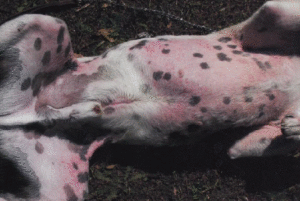Mack the cross-bred dog had only recently moved to Tauranga. He had been enjoying getting to know the area, exploring the bush and parks with his owners. However his owners started to notice he was now spending much of the evenings licking his paws, and he had an itchy, pink rash on his underbelly. There are many things that can cause itchy skin including fleas, dust mites, certain foods, pollens, plants, and some shampoos.
 Dogs and cats can be affected by ‘contact allergies’, where they become itchy from walking through a plant they are allergic to. A very common offender is Wandering Dew, also known as Wandering Willie or Tradescantia fluminensis, which is a common ground cover. Macks owners found that not only was this plant present in some of the areas they were walking him, but it was also in a corner of their back yard.
Dogs and cats can be affected by ‘contact allergies’, where they become itchy from walking through a plant they are allergic to. A very common offender is Wandering Dew, also known as Wandering Willie or Tradescantia fluminensis, which is a common ground cover. Macks owners found that not only was this plant present in some of the areas they were walking him, but it was also in a corner of their back yard.
Mack’s owners removed the Wandering Dew from their yard, and now keep him on a leash in areas where there is Wandering Dew on his walks. Mack had a short course of anti-inflammatories to stop his skin from itching, and a course of antibiotics to heal the bacterial infection that had developed from his licking. They now use a medicated shampoo after any walks where they think he may have been in contact with Wandering Dew.
 Wandering Dew is a trailing perennial with glossy, green leaves, small 3-petalled white flowers in summer. and succulent stems. It prefers moist shaded areas. It is a banned weed in New Zealand, as it forms dense mats under native bush, smothering out native seedings, and opening habitats for other exotic vines and shrubs to invade.
Wandering Dew is a trailing perennial with glossy, green leaves, small 3-petalled white flowers in summer. and succulent stems. It prefers moist shaded areas. It is a banned weed in New Zealand, as it forms dense mats under native bush, smothering out native seedings, and opening habitats for other exotic vines and shrubs to invade.
To remove, it can be gathered into mounds and ‘cooked’ under a black tarpaulin on a sunny day, or sprayed with a product such as Yates Amitrole. It should be disposed of at a rubbish dump, not composted.
